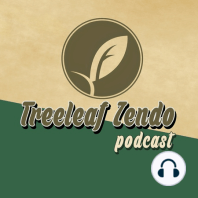10 min listen

SIT-A-LONG with JUNDO: Dogen - A Love Supreme
SIT-A-LONG with JUNDO: Dogen - A Love Supreme
ratings:
Length:
12 minutes
Released:
Jan 27, 2012
Format:
Podcast episode
Description
Really gettin' DOGEN'S WILD SOUND is a lot like gettin' THIS WILD SOUND ...
(Please give a listen, and keep it playing while you read the rest of this post)
http://www.youtube.com/watch?v=-Ds-sc_PJck&feature=player_embedded
I've described Dogen as a JHANA JAZZ MAN-POET, riffing and free expressing-reexpressing-bending-straightening-unbinding-releasing the 'standard tunes' of the Sutras and Koans. The untrained ear can't make head or tail of it, complex rhythms, notes flying, wild tempo ...
Above is what John Coltrane did-undid-diddled-redid, for example, with "MY FAVORITE THINGS", that really "squaresville" (though lovely in its own way) tune that you may recall being chirped by Julie Andrews in THE SOUND OF MUSIC (a great story)! For that reason, a familiarity with the original 'standards' of the American songbook helps a lot in getting where Coltrane was coming from and going to here. Likewise, a good grounding in traditional Buddhist, Mahayana and Zen philosophy and perspectives is vital to getting what Dogen is up to. But Dogen, Master of the WordJazz expression of the Wordless, then takes off bending and re-enlivening those "standard tunes" in ways felt in the skin, flesh, bones, and marrow. Dogen, for example, frequently re-wild-ed and bent up passages from the already wild and bent Lotus Sutra into something even more bent-iferous and wild-acios! Sometimes with Dogen, one can make out clearly the "original melody" he is working with ... a Sutra passage, a Poem, an Old Koan ... and sometimes barely so, for it is not always the "point" he is trying to make through reasoned words, but "the sound, man, the feeling of the music". Dogen and Coltrane make their own musical expression the same but different from the 'standards' that the playful playing is playing upon ... expressing Timeless Old Truths in ways never expressed before ... making Timeless New Truths in the process ... but one also should not forget that that "standard" tune is in there too, and keeps popping up as the theme
The Shobogenzo, for example, is a rather thick and thorny maze to most readers. But once Dogen's basic ways of expression are understood, one can read the entirety with a bit more ease ... though never easy, mind you, as Dogen (like Coltrane) may often have sometimes let the notes and feeling lead him where they would, and may not have been always himself quite sure where the music was taking him -- or what he himself "meant"! Nonetheless, each certainly knew what he "meant" cause of the meaning of the feelings felt!
Below is a passage I read in today's talk from Shobogenzo Bussho, where Dogen is jumping off from some basic Buddhist and Mahayana Teachings and standard Phrases to express the nature of Buddha nature. As part of the Soto Zen Text Project, Prof. Carl Bielefeldt offers some background on a few of these old phrases:
“Sentient beings” (ujō 有情); “the multitude of beings” (gunjō 群生); “multitude of types” (gunrui 群類) [are each terms in Mahayana Buddhism] regularly used as synonyms for “living beings.”
“Initial being” (shi’u 始有); “original being” (hon’u 本有); “marvelous being” (myō’u 妙有); “conditioned being” (en’u 縁有); “deluded being” (mō’u 妄有) [are a] series of terms expressing modes of existence discussed in Buddhist thought. The first, “initial being,” while not itself particularly common, is here contrasted with the familiar “original being,” a term used to express the fundamental reality from which the phenomenal world emerges. The expression “marvelous being” is probably best known in the phrase “true emptiness and marvelous being” (shinkū myō’u 眞空妙有), where it expresses the ultimate emptiness of phenomena. The term “conditioned being” suggests that which exists as a result of conditions — i.e., the conditioned dharmas of dependent origination (engi 縁起; pratīya-samutpāda); “deluded being” suggests that which exists as a result of deluded thoughts — i.e., the false objects of our misguided discrimination (funbetsu 分別; vika
Released:
Jan 27, 2012
Format:
Podcast episode
Titles in the series (100)
Whattsa Who'sa Bodhisattva? - The Virtue of the Precepts: Ten Pure Virtues or "Perfections" (Paramitas in Sanskrit) are fundamental to the Bodhisattva path. Today, we will discuss the Perfection of an ethical life, in keeping with the Precepts (Shila Paramita) by TREELEAF ZENDO PODCAST